2022届高考英语二轮复习:动词时态语态复习课件(33张)
文档属性
| 名称 | 2022届高考英语二轮复习:动词时态语态复习课件(33张) | 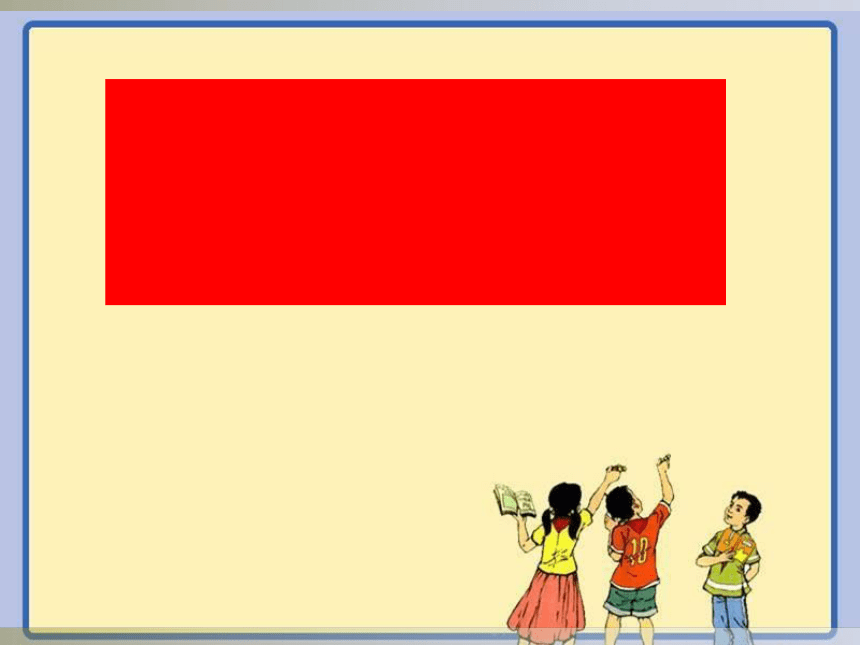 | |
| 格式 | ppt | ||
| 文件大小 | 696.5KB | ||
| 资源类型 | 教案 | ||
| 版本资源 | 通用版 | ||
| 科目 | 英语 | ||
| 更新时间 | 2021-08-23 20:47:34 | ||
图片预览

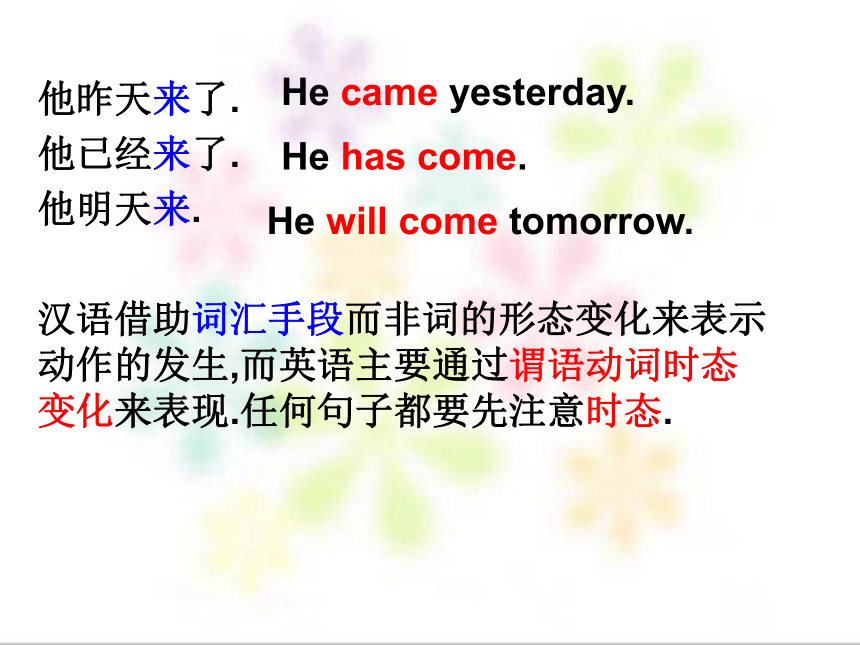
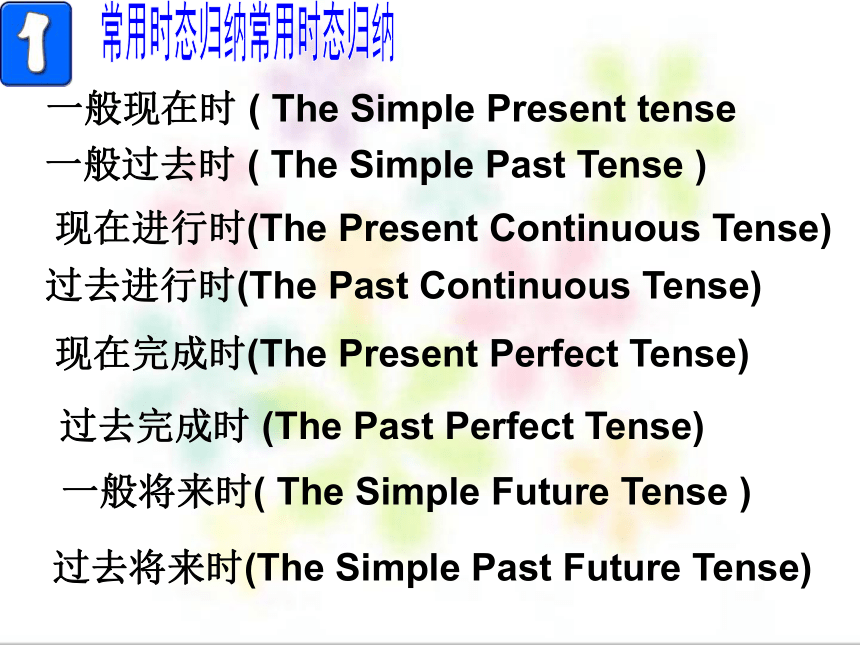

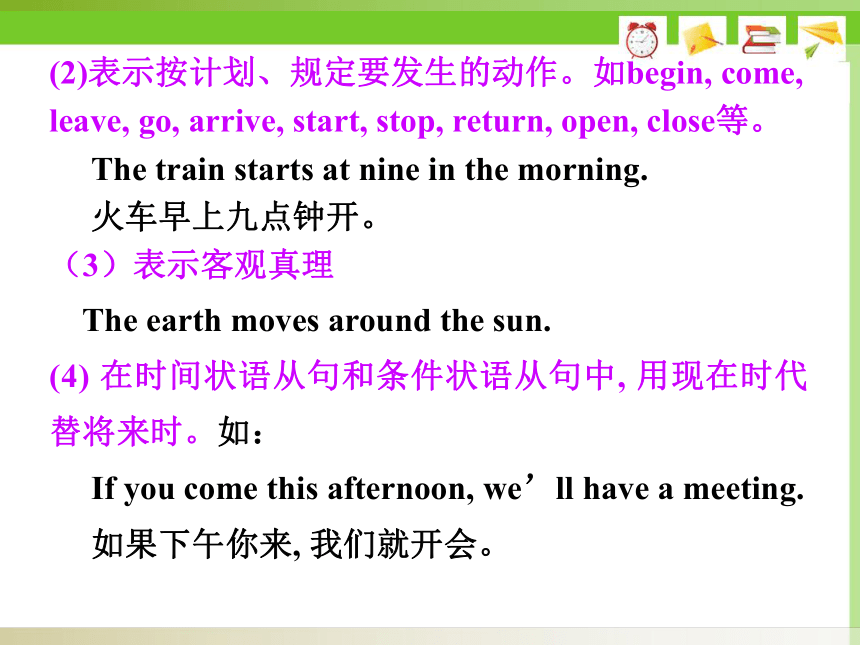
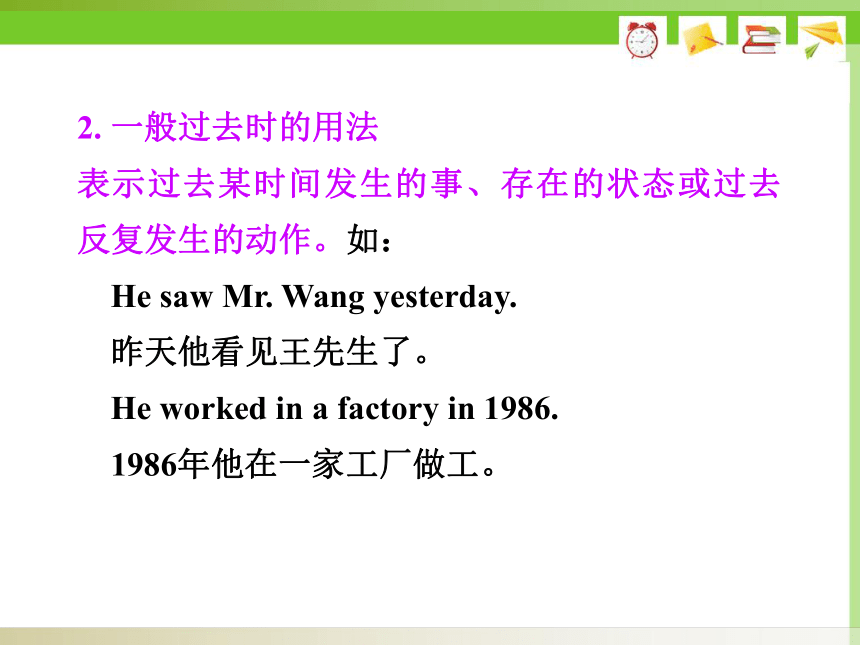

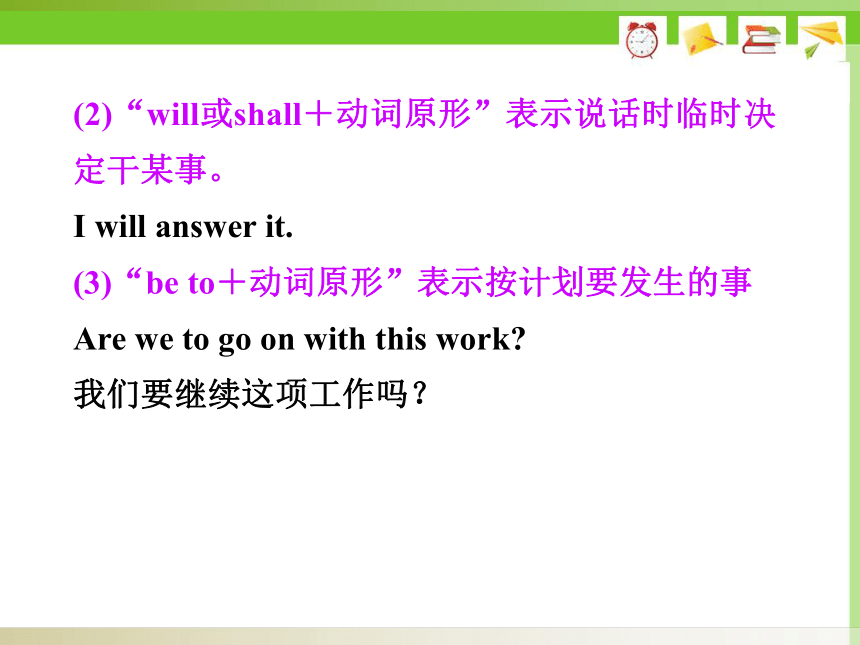
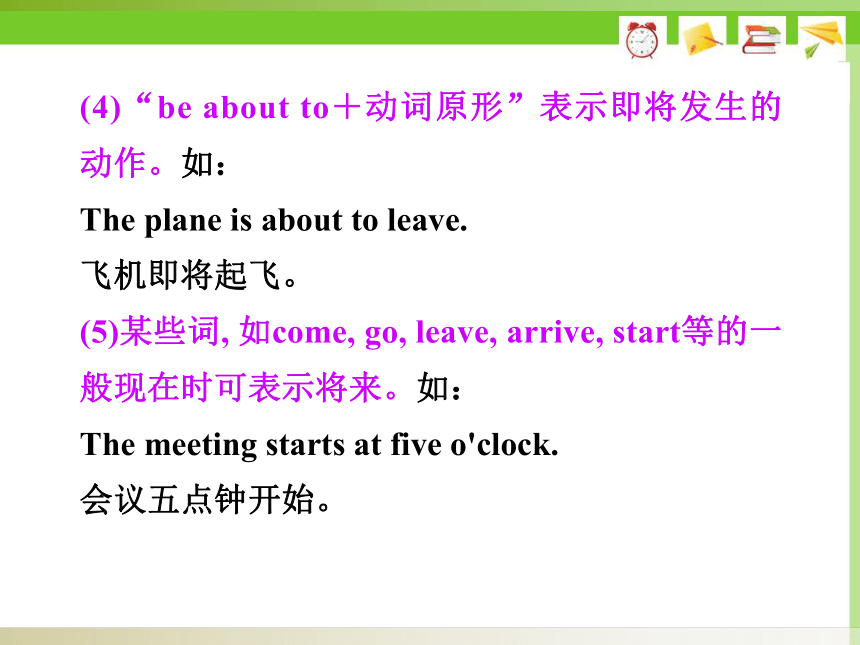
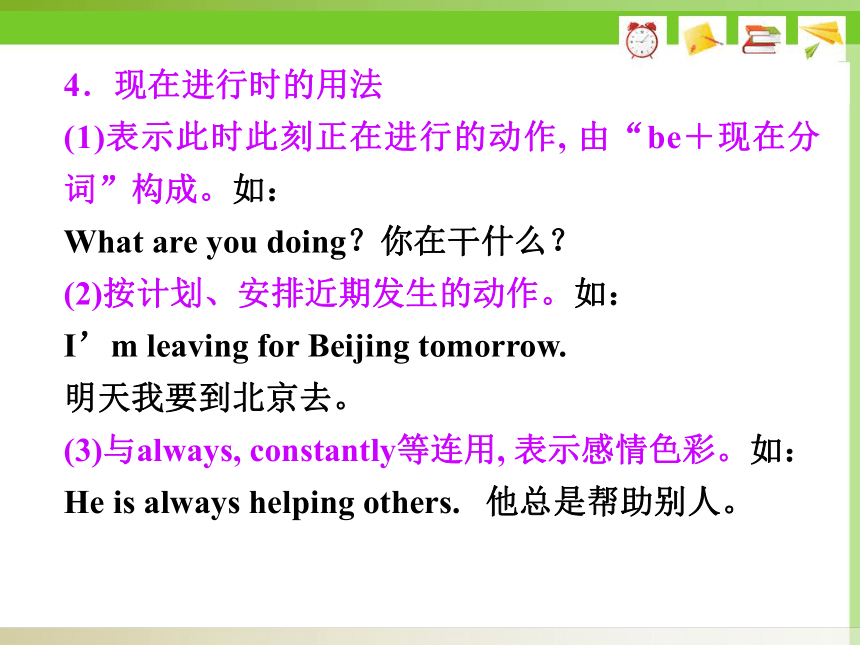
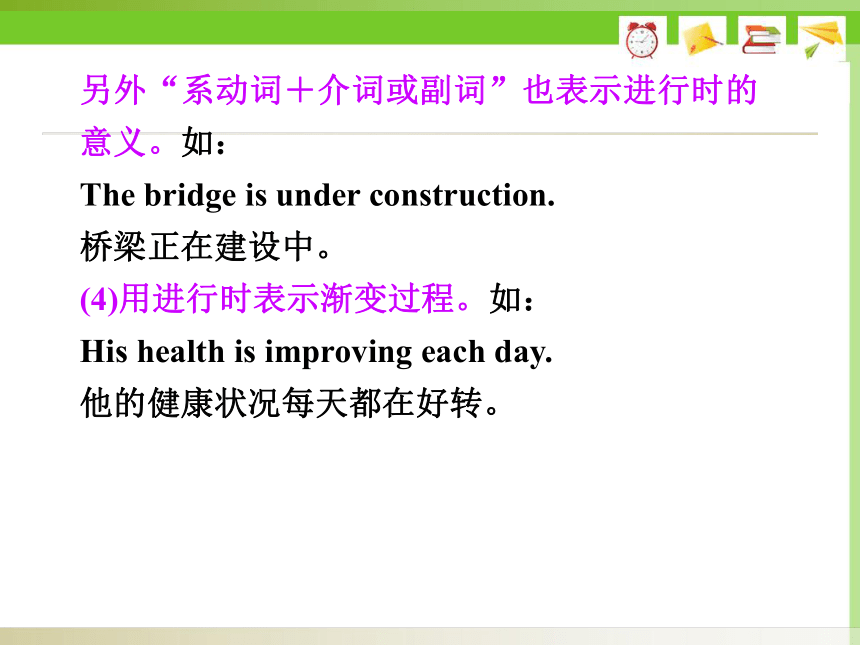
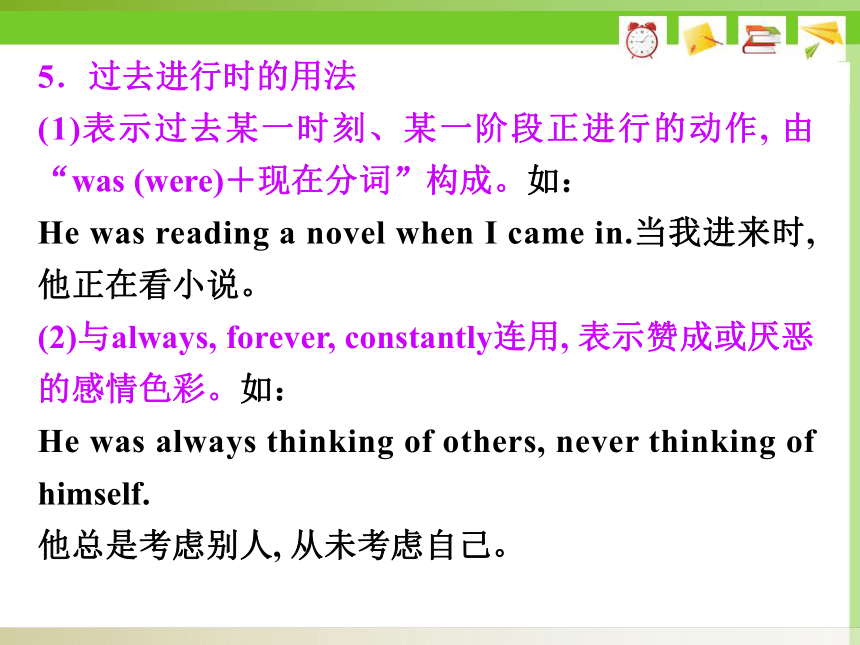
文档简介
(共33张PPT)
动词的时态和语态
二轮复习专项
他昨天来了.
他已经来了.
他明天来.
汉语借助词汇手段而非词的形态变化来表示动作的发生,而英语主要通过谓语动词时态变化来表现.任何句子都要先注意时态.
He
came
yesterday.
He
has
come.
He
will
come
tomorrow.
一般过去时
(
The
Simple
Past
Tense
)
一般现在时
(
The
Simple
Present
tense
一般将来时(
The
Simple
Future
Tense
)
现在进行时(The
Present
Continuous
Tense)
过去进行时(The
Past
Continuous
Tense)
现在完成时(The
Present
Perfect
Tense)
过去完成时?(The
Past
Perfect
Tense)
过去将来时(The
Simple
Past
Future
Tense)
常用时态归纳
1.一般现在时的用法
(1)表示经常性、习惯性的动作和现在的状态、特征,
句中常用often,
usually,
every
day等时间状语。如:
He
goes
to
school
every
day.(经常性动作)
他每天去上学。
He
is
very
happy.(现在的状态)
他很高兴。
时态的基本用法
(2)表示按计划、规定要发生的动作。如begin,
come,
leave,
go,
arrive,
start,
stop,
return,
open,
close等。
The
train
starts
at
nine
in
the
morning.
火车早上九点钟开。
(3)表示客观真理
The
earth
moves
around
the
sun.表
(4)
在时间状语从句和条件状语从句中,
用现在时代替将来时。如:
If
you
come
this
afternoon,
we’ll
have
a
meeting.
如果下午你来,
我们就开会。
示h
moves
around
the
sun.
2.
一般过去时的用法
表示过去某时间发生的事、存在的状态或过去反复发生的动作。如:
He
saw
Mr.
Wang
yesterday.
昨天他看见王先生了。
He
worked
in
a
factory
in
1986.
1986年他在一家工厂做工。
3.一般将来时的用法
一般将来时表示将来的动作或状态,
有以下几种。
“be
going
to+动词原形”
表示“计划、打算要做某事”
表示根据现在的迹象,对未来进行推断。
It
is
going
to
rain.
天要下雨了。
We
are
going
to
have
a
meeting
today.
今天我们开个会。
(2)“will或shall+动词原形”表示说话时临时决定干某事。
I
will
answer
it.
(3)“be
to+动词原形”表示按计划要发生的事
Are
we
to
go
on
with
this
work?
我们要继续这项工作吗?
(4)“be
about
to+动词原形”表示即将发生的动作。如:
The
plane
is
about
to
leave.
飞机即将起飞。
(5)某些词,
如come,
go,
leave,
arrive,
start等的一般现在时可表示将来。如:
The
meeting
starts
at
five
o'clock.
会议五点钟开始。
4.现在进行时的用法
(1)表示此时此刻正在进行的动作,
由“be+现在分词”构成。如:
What
are
you
doing?你在干什么?
(2)按计划、安排近期发生的动作。如:
I’m
leaving
for
Beijing
tomorrow.
明天我要到北京去。
(3)与always,
constantly等连用,
表示感彩。如:
He
is
always
helping
others.
他总是帮助别人。
另外“系动词+介词或副词”也表示进行时的意义。如:
The
bridge
is
under
construction.
桥梁正在建设中。
(4)用进行时表示渐变过程。如:
His
health
is
improving
each
day.
他的健康状况每天都在好转。
5.过去进行时的用法
(1)表示过去某一时刻、某一阶段正进行的动作,
由“was
(were)+现在分词”构成。如:
He
was
reading
a
novel
when
I
came
in.当我进来时,
他正在看小说。
(2)与always,
forever,
constantly连用,
表示赞成或厌恶的感彩。如:
He
was
always
thinking
of
others,
never
thinking
of
himself.
他总是考虑别人,
从未考虑自己。
6.现在完成时的用法
现在完成时由“has/have+过去分词”构成。有2种用法:
(1)
持续性用法
He
has
studied
English
for
5
years.
他学习英语已经五年了。
He
has
studied
English
since
1985.
自从1985年以来他就学习英语。
(2)影响性用法
He
has
seen
the
film.
他已经看过这部电影了。(他很熟悉内容)
He
has
finished
his
homework.
他已经完成作业了。(他可以出去玩了)
一般过去时与现在完成时
的区别
1).
一般过去时只表示发生在过去的动作,
不涉及对现在的影响;
现在完成时表示过去发生的动作对现在的造成的影响。
I
saw
the
film
yesterday.
I
have
seen
the
film
.
I
read
the
novel
last
week.
我上星期看了这部
(只说明过去的情况,不涉及对现在的影响)
(强调对现在的影响,即我很熟悉内容)
2).
过去时常与具体的过去的时间连用,没有延续到现在
现在完成时通常与不确定的或包括现在在内的时间状语连用,或无时间状语.
I
studied
in
Zhongshan
university
in
2000.
I
have
studied
in
Zhongshan
university
since
2000
I
have
just
bought
an
apartment.
(just表示不确定的时间状语)
(since
2000表示从2000年至今,包括现在在内)
(现在没在中大了)
7.
过去完成时的用法
表示过去的过去
By
the
time
he
was
twelve,
Edison
had
begun
to
make
a
living
by
himself.
到了十二岁那年,
爱迪生开始自己谋生。
I
had
learnt
5000
words
before
I
entered
the
university.
我上大学之前就已经学了5000个英语单词了。
When
the
police
arrived,
the
thieves
____________
(run
away).
When
I
came
into
the
classroom,
my
dear
students
____
(begin)
reading.
had
run
away
had
begun
8.
过去将来时的用法
表示从过去的某时间看来将要发生的动作或存在的状态。由“should或would+动词原形”构成。第一人称用should,
其他人称用would。如:
They
were
sure
that
they
would
succeed.
他们确信他们会成功。
动词的语态
语态有两种:主动语态和被动语态。
主语是动作的发出者为主动语态;
主语是动作的接受者为被动语态。
Present/
past
simple(一般现在/过去时)
We
watched
a
film
last
night.
I
drink
milk
everyday.
A
film
_________________________.
Milk
___________________________.
Summary
(总结):
is
/
was
+done
(p.p)
was
watched
by
us
last
night
is
drunk
by
me
everyday
Present/
past
future(一般将来时/
过去将来时)
Will/
would
be
done
新电脑下周将投入使用。
The
new
computers
will
be
used
next
week.
妈妈告诉我我的自行车明天去修。
My
mother
told
me
that
my
bike
would
be
repaired
the
next
day.
Present/
past
progressive
(现在进行时/过去进行时)
am/
is
/are
being
done
was/
were
being
done
中国国家大剧院正在建设当中。
The
National
Opera
Building
is
being
built
at
present.
has/
have
been
done
had
been
done
这个问题已经得到了圆满的解决。
The
problem
has
been
well
solved.
昨天晚上我到超市的时候,牛奶已经卖完了。
The
milk
had
been
sold
when
I
got
to
the
supermarket
last
night.
Present/
past
perfect
(现在完成时/
过去完成时)
不及物动词或动词短语无被动语态
The
accident
was
happened
last
week.
The
accident
happened
last
week.
(错)
(对)
要想正确地使用被动语态,就须注意哪些动词是及物的,哪些是不及物的。特别是一词多义的动词往往有两种用法。解决这一问题唯有在学习过程中多留意积累。
一般现在时:
be(
am/are/is)
+
done
一般过去时:
be(was/
were)
+
done
一般将来时:
will
be
+
done
过去将来时:
would
be
+
done
现在进行时:
be(
am/are/is)+
being+
done
过去进行时:be(was/
were
)+
being+
done.
现在完成时:
have/
has+
been
+
done.
过去完成时:had
+
been
+
done
Challenge
yourself!!!!
1、对於这个问题,关注很少。
Little
attention
was
paid
to
this
problem.
2、课堂上应该鼓励小组讨论。
Group
discussion
should
be
encouraged
in
class.
3、据报导,这里将修建一条新的马路。
It
is
reported
that
a
new
road
will
be
built
here.
4、必须采取措施来防止河流受到污染。
Measures
should
be
taken
to
stop
the
river
from
being
polluted.
1.The
pen
I
________
I
________
is
on
my
desk,right
under
my
nose.
A.think;
lost
B.thought;
had
lost
C.think;
had
lost
D.thought;
lost
2.—We
could
have
walked
to
the
station.It
was
so
near.
—Yes,a
taxi
________
at
all
necessary.
A.wasn’t
B.hadn’t
been
C.couldn’t
be
D.won’t
be
3.A
friend
of
mine
returned
to
his
house
after
a
holiday
only
to
find
it
________.
A.to
be
broken
B.had
broken
into
C.was
broken
D.had
been
broken
into
4.—Do
you
like
the
new
pen?
—Yes,it
________
very
well.
A.is
written
B.is
writing
C.writes
D.wrote
5.However
hard
you
________,you
will
never
succeed
in
pleasing
her.
A.try
B.will
try
C.should
try
D.would
try
6.—Can
I
help
you,sir?
—Yes,I
bought
this
radio
yesterday,but
it
________.
A.didn’t
work
B.won’t
work
C.can’t
work
D.doesn’t
work
7.—How
are
you
today?
—Oh,I
________
as
ill
as
I
do
now
for
a
very
long
time.
A.didn’t
feel
B.wasn’t
feeling
C.don’t
feel
D.haven’t
felt
8.When
Jack
arrived
he
learned
Mary
________
for
about
an
hour.
A.had
gone
B.had
set
off
C.had
left
D.had
been
away
9.By
this
time
tomorrow
we
________
the
machine.
A.have
repaired
B.shall
have
repaired
C.will
repair
D.would
repair
10.I
don’t
think
Jim
saw
me,he
________
into
space.
A.just
stared
B.was
just
staring
C.has
just
stared
D.had
just
stared
11.Helen
________
her
key
in
the
office
so
she
had
to
wait
until
her
husband
________
home.
A.had
left;
came
B.has
left;
comes
C.left;
had
come
D.had
left;
would
come
12.—You
have
left
the
light
on.
—Oh,so
I
have.________
and
turn
it
off.
A.I’ll
go
B.I’ve
gone
C.I
go
D.I’m
going
动词的时态和语态
二轮复习专项
他昨天来了.
他已经来了.
他明天来.
汉语借助词汇手段而非词的形态变化来表示动作的发生,而英语主要通过谓语动词时态变化来表现.任何句子都要先注意时态.
He
came
yesterday.
He
has
come.
He
will
come
tomorrow.
一般过去时
(
The
Simple
Past
Tense
)
一般现在时
(
The
Simple
Present
tense
一般将来时(
The
Simple
Future
Tense
)
现在进行时(The
Present
Continuous
Tense)
过去进行时(The
Past
Continuous
Tense)
现在完成时(The
Present
Perfect
Tense)
过去完成时?(The
Past
Perfect
Tense)
过去将来时(The
Simple
Past
Future
Tense)
常用时态归纳
1.一般现在时的用法
(1)表示经常性、习惯性的动作和现在的状态、特征,
句中常用often,
usually,
every
day等时间状语。如:
He
goes
to
school
every
day.(经常性动作)
他每天去上学。
He
is
very
happy.(现在的状态)
他很高兴。
时态的基本用法
(2)表示按计划、规定要发生的动作。如begin,
come,
leave,
go,
arrive,
start,
stop,
return,
open,
close等。
The
train
starts
at
nine
in
the
morning.
火车早上九点钟开。
(3)表示客观真理
The
earth
moves
around
the
sun.表
(4)
在时间状语从句和条件状语从句中,
用现在时代替将来时。如:
If
you
come
this
afternoon,
we’ll
have
a
meeting.
如果下午你来,
我们就开会。
示h
moves
around
the
sun.
2.
一般过去时的用法
表示过去某时间发生的事、存在的状态或过去反复发生的动作。如:
He
saw
Mr.
Wang
yesterday.
昨天他看见王先生了。
He
worked
in
a
factory
in
1986.
1986年他在一家工厂做工。
3.一般将来时的用法
一般将来时表示将来的动作或状态,
有以下几种。
“be
going
to+动词原形”
表示“计划、打算要做某事”
表示根据现在的迹象,对未来进行推断。
It
is
going
to
rain.
天要下雨了。
We
are
going
to
have
a
meeting
today.
今天我们开个会。
(2)“will或shall+动词原形”表示说话时临时决定干某事。
I
will
answer
it.
(3)“be
to+动词原形”表示按计划要发生的事
Are
we
to
go
on
with
this
work?
我们要继续这项工作吗?
(4)“be
about
to+动词原形”表示即将发生的动作。如:
The
plane
is
about
to
leave.
飞机即将起飞。
(5)某些词,
如come,
go,
leave,
arrive,
start等的一般现在时可表示将来。如:
The
meeting
starts
at
five
o'clock.
会议五点钟开始。
4.现在进行时的用法
(1)表示此时此刻正在进行的动作,
由“be+现在分词”构成。如:
What
are
you
doing?你在干什么?
(2)按计划、安排近期发生的动作。如:
I’m
leaving
for
Beijing
tomorrow.
明天我要到北京去。
(3)与always,
constantly等连用,
表示感彩。如:
He
is
always
helping
others.
他总是帮助别人。
另外“系动词+介词或副词”也表示进行时的意义。如:
The
bridge
is
under
construction.
桥梁正在建设中。
(4)用进行时表示渐变过程。如:
His
health
is
improving
each
day.
他的健康状况每天都在好转。
5.过去进行时的用法
(1)表示过去某一时刻、某一阶段正进行的动作,
由“was
(were)+现在分词”构成。如:
He
was
reading
a
novel
when
I
came
in.当我进来时,
他正在看小说。
(2)与always,
forever,
constantly连用,
表示赞成或厌恶的感彩。如:
He
was
always
thinking
of
others,
never
thinking
of
himself.
他总是考虑别人,
从未考虑自己。
6.现在完成时的用法
现在完成时由“has/have+过去分词”构成。有2种用法:
(1)
持续性用法
He
has
studied
English
for
5
years.
他学习英语已经五年了。
He
has
studied
English
since
1985.
自从1985年以来他就学习英语。
(2)影响性用法
He
has
seen
the
film.
他已经看过这部电影了。(他很熟悉内容)
He
has
finished
his
homework.
他已经完成作业了。(他可以出去玩了)
一般过去时与现在完成时
的区别
1).
一般过去时只表示发生在过去的动作,
不涉及对现在的影响;
现在完成时表示过去发生的动作对现在的造成的影响。
I
saw
the
film
yesterday.
I
have
seen
the
film
.
I
read
the
novel
last
week.
我上星期看了这部
(只说明过去的情况,不涉及对现在的影响)
(强调对现在的影响,即我很熟悉内容)
2).
过去时常与具体的过去的时间连用,没有延续到现在
现在完成时通常与不确定的或包括现在在内的时间状语连用,或无时间状语.
I
studied
in
Zhongshan
university
in
2000.
I
have
studied
in
Zhongshan
university
since
2000
I
have
just
bought
an
apartment.
(just表示不确定的时间状语)
(since
2000表示从2000年至今,包括现在在内)
(现在没在中大了)
7.
过去完成时的用法
表示过去的过去
By
the
time
he
was
twelve,
Edison
had
begun
to
make
a
living
by
himself.
到了十二岁那年,
爱迪生开始自己谋生。
I
had
learnt
5000
words
before
I
entered
the
university.
我上大学之前就已经学了5000个英语单词了。
When
the
police
arrived,
the
thieves
____________
(run
away).
When
I
came
into
the
classroom,
my
dear
students
____
(begin)
reading.
had
run
away
had
begun
8.
过去将来时的用法
表示从过去的某时间看来将要发生的动作或存在的状态。由“should或would+动词原形”构成。第一人称用should,
其他人称用would。如:
They
were
sure
that
they
would
succeed.
他们确信他们会成功。
动词的语态
语态有两种:主动语态和被动语态。
主语是动作的发出者为主动语态;
主语是动作的接受者为被动语态。
Present/
past
simple(一般现在/过去时)
We
watched
a
film
last
night.
I
drink
milk
everyday.
A
film
_________________________.
Milk
___________________________.
Summary
(总结):
is
/
was
+done
(p.p)
was
watched
by
us
last
night
is
drunk
by
me
everyday
Present/
past
future(一般将来时/
过去将来时)
Will/
would
be
done
新电脑下周将投入使用。
The
new
computers
will
be
used
next
week.
妈妈告诉我我的自行车明天去修。
My
mother
told
me
that
my
bike
would
be
repaired
the
next
day.
Present/
past
progressive
(现在进行时/过去进行时)
am/
is
/are
being
done
was/
were
being
done
中国国家大剧院正在建设当中。
The
National
Opera
Building
is
being
built
at
present.
has/
have
been
done
had
been
done
这个问题已经得到了圆满的解决。
The
problem
has
been
well
solved.
昨天晚上我到超市的时候,牛奶已经卖完了。
The
milk
had
been
sold
when
I
got
to
the
supermarket
last
night.
Present/
past
perfect
(现在完成时/
过去完成时)
不及物动词或动词短语无被动语态
The
accident
was
happened
last
week.
The
accident
happened
last
week.
(错)
(对)
要想正确地使用被动语态,就须注意哪些动词是及物的,哪些是不及物的。特别是一词多义的动词往往有两种用法。解决这一问题唯有在学习过程中多留意积累。
一般现在时:
be(
am/are/is)
+
done
一般过去时:
be(was/
were)
+
done
一般将来时:
will
be
+
done
过去将来时:
would
be
+
done
现在进行时:
be(
am/are/is)+
being+
done
过去进行时:be(was/
were
)+
being+
done.
现在完成时:
have/
has+
been
+
done.
过去完成时:had
+
been
+
done
Challenge
yourself!!!!
1、对於这个问题,关注很少。
Little
attention
was
paid
to
this
problem.
2、课堂上应该鼓励小组讨论。
Group
discussion
should
be
encouraged
in
class.
3、据报导,这里将修建一条新的马路。
It
is
reported
that
a
new
road
will
be
built
here.
4、必须采取措施来防止河流受到污染。
Measures
should
be
taken
to
stop
the
river
from
being
polluted.
1.The
pen
I
________
I
________
is
on
my
desk,right
under
my
nose.
A.think;
lost
B.thought;
had
lost
C.think;
had
lost
D.thought;
lost
2.—We
could
have
walked
to
the
station.It
was
so
near.
—Yes,a
taxi
________
at
all
necessary.
A.wasn’t
B.hadn’t
been
C.couldn’t
be
D.won’t
be
3.A
friend
of
mine
returned
to
his
house
after
a
holiday
only
to
find
it
________.
A.to
be
broken
B.had
broken
into
C.was
broken
D.had
been
broken
into
4.—Do
you
like
the
new
pen?
—Yes,it
________
very
well.
A.is
written
B.is
writing
C.writes
D.wrote
5.However
hard
you
________,you
will
never
succeed
in
pleasing
her.
A.try
B.will
try
C.should
try
D.would
try
6.—Can
I
help
you,sir?
—Yes,I
bought
this
radio
yesterday,but
it
________.
A.didn’t
work
B.won’t
work
C.can’t
work
D.doesn’t
work
7.—How
are
you
today?
—Oh,I
________
as
ill
as
I
do
now
for
a
very
long
time.
A.didn’t
feel
B.wasn’t
feeling
C.don’t
feel
D.haven’t
felt
8.When
Jack
arrived
he
learned
Mary
________
for
about
an
hour.
A.had
gone
B.had
set
off
C.had
left
D.had
been
away
9.By
this
time
tomorrow
we
________
the
machine.
A.have
repaired
B.shall
have
repaired
C.will
repair
D.would
repair
10.I
don’t
think
Jim
saw
me,he
________
into
space.
A.just
stared
B.was
just
staring
C.has
just
stared
D.had
just
stared
11.Helen
________
her
key
in
the
office
so
she
had
to
wait
until
her
husband
________
home.
A.had
left;
came
B.has
left;
comes
C.left;
had
come
D.had
left;
would
come
12.—You
have
left
the
light
on.
—Oh,so
I
have.________
and
turn
it
off.
A.I’ll
go
B.I’ve
gone
C.I
go
D.I’m
going
